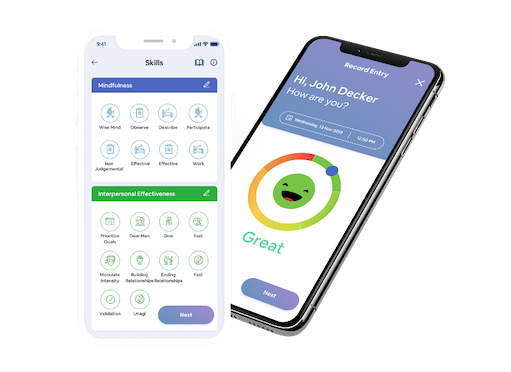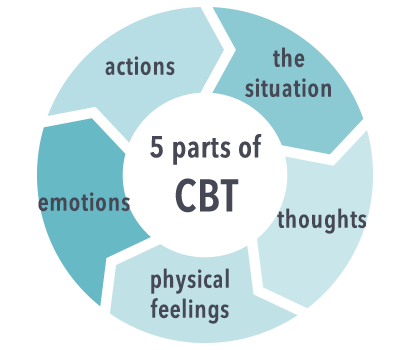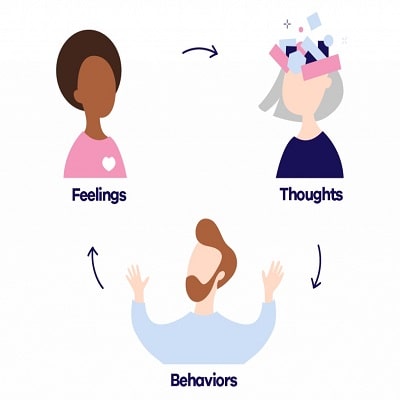If you are struggling with a behavioral health concern and seeking help, there are a myriad of treatments and therapies.. Some offer medications to soothe the chemical imbalances present within the brain, while some are based on therapeutic tools like yoga or meditation to ease distress. At times, the supervision model is also used where the individual can seek guidance from a wise person to avoid making poor decisions. All of them work, but there is one that works a little better: talk therapy, an evidence-based treatment approach that processes from a unique perspective that involves communication, acceptance, and mindfulness. During these therapy sessions, people learn to address their issues more compassionately by digging into its roots and finally working up their way to healthy change without force.
This article discusses two main kinds of therapies, namely, Cognitive Behavioral Therapy (CBT)and Dialectical Behavior Therapy (DBT), with the help of which you can differentiate and understand which therapy is the best for you.
You might have noticed that these two approaches have similar names, which shed some light on how they're related. DBT is a modified form of CBT, but its approach to treatment is distinct enough from CBT, which is why the two therapies are generally considered unique.
Both CBT and DBT are supported by research and various controlled trials that prove their efficacy to treat multiple mental health issues. However, several important factors may influence which model a therapist uses to treat a patient.
What is CBT?
CBT is one of the most commonly used psychotherapies for treating mental health issues like depression, drug dependency, post-traumatic stress, and anxiety. Widely used to treat addiction problems, CBT is designed to help patients develop replacement activities when their urges towards dysfunctional behaviors start to grow. In a study published by the Australian and New Zealand Journal of Psychiatry, it is reported that CBT is extremely effective in treating internet addiction and allows people to develop better management skills and advanced emotional, cognitive, and behavioral signs. CBT uses acceptance and change techniques where aspects of logic and reasoning are applied to control thoughts and modify their direction towards improvement. Research has shown that CBT's power lies in its unique approach of reinforcing one's thought process, which is why clinicians implement this therapy for treating various mental disorders.
What is DBT?
Dialectical behavior therapy orDBTis a specific version of CBT, with a larger focus on an individual's emotional and social aspects. DBT was first developed by Dr. Marsha Lienhan to help people cope with extremely vulnerable or unstable emotions that make them susceptible to destructive behaviors. DBT is an evidence-based approach to help people regulate their emotions and tolerate distress, at ease. Although it started as a treatment for borderline personality disorder, current research shows that it may help people dealing with issues like mindless eating, self-harm, and stained relationships. Over time, DBT has proven immensely effective in nature. According to JAMA Psychiatry, people practicing DBT are 50 percent less likely to attempt suicide or drop out of their ongoing treatment. This proves that DBT enables individuals to ease their harmful symptoms and work up their way towards a meaningful life as they strive to achieve their intended goals through this program.
The Difference in Their Treating Methods
Not all mental health issues respond in the same way when treated. Also, every concern requires to be addressed in a specific manner with a specific program. A therapy program that works well with depression and anxiety may not be effective when it comes to personality disorders or self-harm issues.
CBT has proven to be incredibly effective in treating the following mental health issues:
- Depression
- Anxiety
- Panic attacks
- Stress issues and OCD
The primary feature of CBT is that it focuses on how your thoughts, feelings, and behavior influence each other. CBT is originally based on the aspects of reasoning and rationality that has its roots in Stoic philosophy and Socratic Philosophy. CBT teaches patients the skill to recognize when their feelings might become troublesome and apply techniques to redirect those emotions.
DBT emphasizes helping people accept the ongoing situation and change their behavior patterns accordingly. Contrary to CBT, it avoids the technique of trying to think or talk through the issues they are dealing with. This therapy type helps those who have developed patterns of intense emotional vulnerabilities and impulsive behaviors in response to overwhelming emotions of abandonment and pain. – DBT is considered the most effective therapy to treat people who struggle with self-harm behaviors, chronic suicidal ideation, or dysfunctional habits like over-eating, overworking, or addiction. Child abuse and sexual violence survivors also respond well to DBT techniques. This program enables patients to accept the truth and live with it, rather than making pointless efforts to modify the fact and inflicting further pain on themselves.DBTrelies heavily on mindfulness techniques to allow patients to acknowledge themselves and regulate their emotions without turning to harmful behaviors.

Is one better than the other?
People suffering from depression and anxiety disorders have found a lot of success with CBT, whereas people with Borderline Personality Disorder and other self-harm issues have found DBT effective. It's important to note that many people have more than one diagnosis; therefore, integrating both the elements of CBT and DBT helps them manage their symptoms.
The best way to understand which therapy is the most effective one for you is to seek help from a mental health professional – a therapist, psychiatrist, or psychologist. They will analyze your symptoms, treatment history, and personal therapy goals and thereby recommend the best treatments.
Self-help tools
The world has changed, and we have tools and technology for almost everything. Swasth has developed feature-rich apps for specific evidence-based treatment modalities like CBT Companion and DBT Coach for augmenting the experience of the therapy sessions.

You can also get help with clinicians and coaches who specialize in specific issues by using our Behavioral Health Platform.




